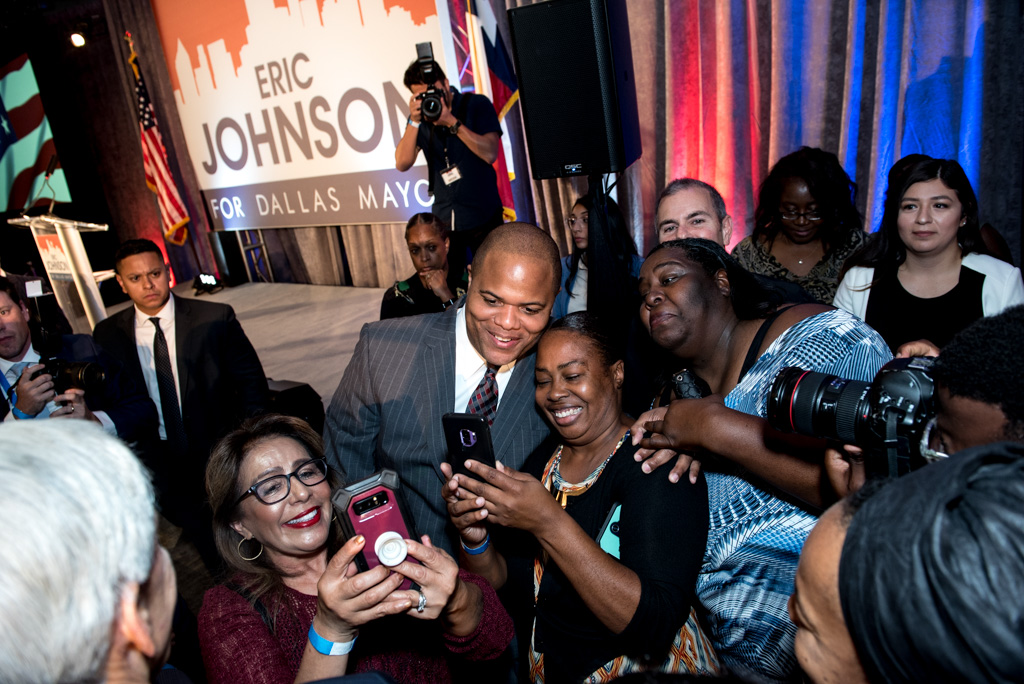The mayor’s race was basically over at 7 p.m., when early voting results hit the county’s website.
State Rep. Eric Johnson came out of the gate with an 18-point lead over Councilman Scott Griggs and didn’t look back. He’d end the night with 41,208 votes, almost 10,000 more than his opponent, winning by 11 percent. Only 10 percent of registered voters cast a ballot.
Griggs and his closest ally, the downtown-Uptown-East Dallas Councilman Philip Kingston, both cratered in the runoff. Kingston lost by 7 percentage points—745 votes—to the mortgage banker David Blewett, the same guy he easily beat in 2013 when he first ran for the District 14 seat. If you are the type who looks for broader meaning in such things, it would seem a stunning rebuke of the confrontational and theatrical legislating that originated from Kingston’s seat. In the many debates leading up to last night, Johnson tied Griggs to his buddy Philip. It proved to be a winning strategy. They were the “divisive” crew, the two representatives who would set the city back, the “progressive bloc” that didn’t believe in the type of growth that would grow the tax base. True or not, it resonated.
Kingston and Griggs both ran on campaigns touting their customer service—if there’s a pothole near you, we’ll get city staff out to fix it. Griggs fought against what he called vanity projects, such as the Margaret Hunt Hill Bridge. He put his cell phone number on his campaign literature. But he was still close with Kingston, the councilman who once tore up a colleague’s amendment, threw the paper in the air, and then got in the mayor’s face during a Council meeting.
Johnson even said during a debate that Kingston was almost “singlehandedly” the reason he decided to run. They’d worked together on the tricky redo of the Garland-Grand-Gaston intersection in Lakewood. “For the first time ever I was directly impacted by the tactics that has caused our City Council to become as divided as it currently is,” he said.
Johnson positioned himself as a unifier and collaborator, and he got the city’s business community behind him. Griggs had less money and the support of neighborhoods, as well as the largest unions for the police and fire departments. He made public safety his top issue, calling it “a crisis,” and the month of the runoff there were 40 murders in the city of Dallas—the most since the 1990s. (Johnson described Grigg’s public safety focus as scare tactics, then later ranked it as his number one priority in late-in-the-race political tweets.) Many Dallas politics wonks thought the race would be a tossup. It wasn’t. Kingston, too, had the support of the working class; I ran into a volunteer with the Workers Defense Project who had been sitting outside the Oak Lawn Library in 95-degree heat since 7 a.m., thanking people who voted. None of that moved the dial.
“I think tonight the voters of Dallas have said, ‘Thank you very much. We appreciate the effort in the legislature. We appreciate the hard work,” Johnson said at his watch party in a ballroom at the Fairmont Hotel. “But we want you to come home.”
Griggs had his party at the historic Longhorn Ballroom, the enormous one-time honky tonk in the Cedars that also hosted a violent Sex Pistols show and an Aerosmith video shoot. (The venue, of course, played footage from each before changing to a slideshow of Griggs-related photographs.) Johnson’s party had turkey and roast beef carving stations. Griggs had tacos and free Miller Lite. There were, at its peak, about 200 people in the 2,500-capacity venue. The dance floor was a ghost town. DJ Blake Ward played Ariana Grande’s “thank u, next” and Pharrell’s “Happy.”
Council members Adam Medrano and Omar Narvaez didn’t want to talk to a reporter, on the record or otherwise. Chad West, the man who will be North Oak Cliff’s next councilman, spoke of being inspired by Griggs and said he is the “hardest worker and smartest person in the room.” At one point, the electricity went out, leaving the place pitch black. Which seems too cliché to be real, but it happened.
Griggs showed up just before 9 p.m. His supporters clapped. He shook hands and did the rounds. He corralled reporters into a corner and then didn’t speak to us the rest of the night. Any hope for some immediate thoughts about what the losses meant for Griggs’ priorities around the horseshoe went out the window. The candidate grabbed the microphone around 11 p.m., encouraging his supporters to “keep up the fight at City Hall.” By that time, there were about 60 people in the venue. He did not mention his opponent.
On the other side of downtown, Johnson addressed a packed room. He stood next to his wife—whom he affectionately called “wonder woman”—and thanked his mother and father. He recounted his upbringing, growing up in West Dallas and Oak Cliff, going to Greenhill before Harvard and Princeton. He said that, despite his support from prominent business leaders, nobody influenced him to run. “I did not run for mayor at anybody’s urging or insistence,” he said. “I’m not anybody’s tool. I’m not anybody’s fool. I’m a person who loves Dallas.”
And that person is now your mayor.
This was taken from our D Brief newsletter, which gets sent out each Sunday. Not a subscriber? You can fix that. Special thanks to Shawn Shinneman, who reported from Johnson’s party.





